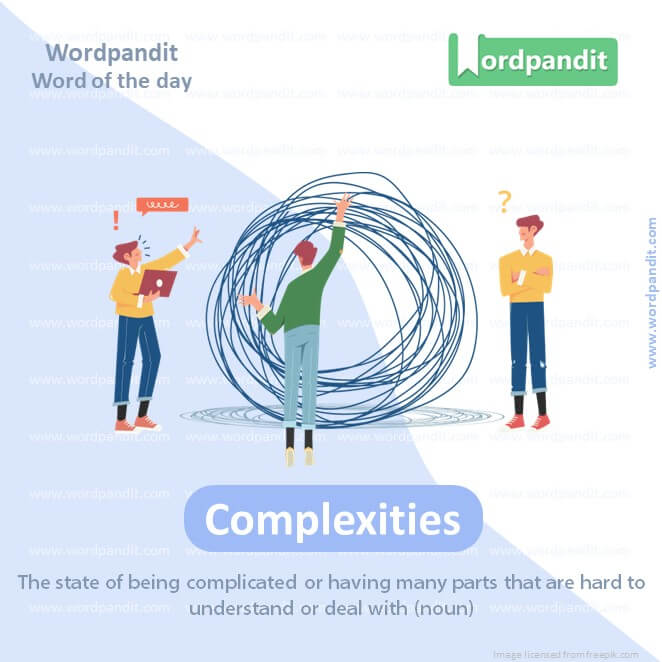Daily Vocabulary Words: List of Daily Used Words
Hi there. Welcome to this special section @ Wordpandit.
Our endeavour here is straightforward: highlighting important daily vocabulary words, you would encounter in The Hindu. This is your repository of commonly used words; essentially, we are posting a list of daily used words. Hence, this has significant practical application as it teaches you words that are commonly used in a leading publication such as The Hindu.
Visit the website daily to learn words from The Hindu.
WORD-1: Surmised
CONTEXT: As the article surmised succinctly, “If we cannot find TB, we cannot treat TB. And if we cannot treat TB, we cannot end TB”.
SOURCE: The Hindu
EXPLANATORY PARAGRAPH: Imagine you’re playing a guessing game with your friends. They give you clues, and you try to figure out what they’re talking about. When you make a guess based on those clues, you’re “surmising.” It’s like making an educated guess or forming an opinion based on available information.
MEANING: To infer or deduce something without direct evidence; to guess or suppose (verb).
PRONUNCIATION: suhr-MYZD
SYNONYMS: speculate, conjecture, guess, infer, assume
USAGE EXAMPLE:
1. She surmised that he was not coming based on his previous behavior.
2. The detective surmised that the crime was committed by someone familiar with the area.
3. Based on the evidence, the researchers surmised a possible explanation for the phenomenon.
4. He surmised from her expression that she was not pleased with the outcome.

WORD-2: Leveraging
CONTEXT: We can detect it largely by leveraging and optimising the systems and processes already in place, as well as by quickly deploying newer proven technologies that take diagnosis as close to the point of care as possible.
SOURCE: The Hindu
EXPLANATORY PARAGRAPH: Imagine you have a small tool that helps you lift something heavy with less effort. That tool is called a “lever.” When you use this lever to make a task easier or more effective, you’re “leveraging” it. It’s like using a smart strategy or resource to achieve better results.
MEANING: Using something to its maximum advantage (verb).
PRONUNCIATION: LEV-er-ij-ing
SYNONYMS: utilizing, exploiting, capitalizing, utilizing, harnessing
USAGE EXAMPLE:
1. The company is leveraging new technology to improve its productivity.
2. She is leveraging her network of contacts to find job opportunities.
3. The marketing team is leveraging social media platforms to reach a wider audience.
4. Leveraging his experience in finance, he made successful investments in the stock market.
WORD-3: Cascade
CONTEXT: This must be used on a wider scale so that we can find and absorb potential patients into the care cascade faster.
SOURCE: The Hindu
EXPLANATORY PARAGRAPH: Imagine a series of small waterfalls flowing down a mountain. Each waterfall leads to the next, creating a beautiful and continuous flow of water. This series of waterfalls is called a “cascade.” It’s like things happening one after another in a smooth and connected way.
MEANING: A series of events or processes that happen in a sequence, often with each one leading to the next (noun).
PRONUNCIATION: kas-KEYD
SYNONYMS: series, succession, chain, progression, flow
USAGE EXAMPLE:
1. The cascade of events that followed the announcement changed the course of history.
2. The company’s success was attributed to a cascade of innovative ideas.
3. The cascade of errors in the project caused delays and budget overruns.
4. Her promotion set off a cascade of celebrations among her colleagues.

WORD-4: Proactive
CONTEXT: We need to simply improve implementation and be more proactive in deploying new technologies.
SOURCE: The Hindu
EXPLANATORY PARAGRAPH: Imagine you’re playing a game where you have to anticipate what will happen next and prepare for it. Instead of waiting for things to happen and then reacting, you take action ahead of time to make sure everything goes smoothly. This approach of being ready and taking initiative is called “proactive.”
MEANING: Taking action by causing change and not only reacting
to change when it happens.
PRONUNCIATION: proh-AK-tiv
SYNONYMS: preemptive, anticipatory, forward-thinking, initiative, preventive
USAGE EXAMPLE:
1. The company adopted a proactive approach to address customer complaints before they escalated.
2. Being proactive in maintaining a healthy lifestyle can prevent many health issues.
3. The proactive measures taken by the government helped mitigate the impact of the natural disaster.
4. She’s known for her proactive attitude in solving problems before they become major issues.
WORD-5: Streamlined
CONTEXT: We need to ensure that new technologies are streamlined and rolled out faster and build capacity at the sub-district level to conduct such tests as needed.
SOURCE: The Hindu
EXPLANATORY PARAGRAPH: Imagine you have a messy desk with papers scattered everywhere. You organize the papers neatly, remove what you don’t need, and make everything efficient and tidy. This organized and efficient state is called “streamlined.” It’s like making things work smoothly without unnecessary complications.
MEANING: Made more efficient or organized by removing unnecessary elements or steps (adjective).
PRONUNCIATION: streem-LAHYN(D)
SYNONYMS: efficient, organized, simplified, optimized, refined
USAGE EXAMPLE:
1. The streamlined process reduced production costs and improved output.
2. The new software streamlined the company’s inventory management.
3. Her streamlined approach to time management allowed her to accomplish more tasks.
4. The streamlined design of the car reduced drag and improved fuel efficiency.

WORD-6: Complexities
CONTEXT: As India grapples with the complexities of controlling TB, we need a paradigm shift urgently — one that places those affected and their lived experiences at the centre of tackling this ancient disease.
SOURCE: The Hindu
EXPLANATORY PARAGRAPH: Imagine you’re trying to solve a puzzle with many pieces that fit together in intricate ways. Each piece adds to the challenge, and figuring it all out requires careful thinking. These challenging and intricate parts of a puzzle are called “complexities.” It’s like dealing with things that are not simple or straightforward.
MEANING: The state of being complicated or having many parts that are hard to
understand or deal with (noun)
PRONUNCIATION: kuhm-plek-SIH-teez
SYNONYMS: intricacies, complications, intricateness, difficulties, nuances
USAGE EXAMPLE:
1. The project’s complexities required a team of experts to unravel.
2. She navigated through the legal complexities of starting her own business.
3. Understanding the complexities of climate change requires interdisciplinary research.
4. The novel explores the complexities of human relationships and emotions.

WORD-7: Necessitating
CONTEXT: Symptoms are often ignored and mistaken for other common ailments, leading to delays in reporting. Compulsory screening for family and contacts of each index case is essential, necessitating availability of laboratory facilities and efficient follow-up mechanisms within health systems.
SOURCE: The Hindu
EXPLANATORY PARAGRAPH: Imagine you have to do something because there’s no other choice. It’s like when you have to eat vegetables to stay healthy, even if you don’t like them. This need or requirement to do something because of a particular situation is called “necessitating.”
MEANING: Making something necessary (verb)
PRONUNCIATION: nuh-suh-si-tey-ting
SYNONYMS: requiring, demanding, mandating, compelling, obliging
USAGE EXAMPLE:
1. The company’s growth necessitated the hiring of more employees.
2. His injury necessitated a change in his training regimen.
3. The urgent situation necessitated immediate action.
4. The new law necessitates stricter security measures.
WORD-8: Regimens
CONTEXT: Unregulated use of antibiotics and non-compliance with treatment regimens lead to selective evolutionary pressure on the bacillus, in turn resulting in developing drug resistance.
SOURCE: The Hindu
EXPLANATORY PARAGRAPH: Imagine you have a plan or schedule for doing something every day, like exercise or studying. This organized and structured plan that you follow regularly is called a “regimen.” It’s like having a routine that helps you stay disciplined and focused on your goals.
MEANING: A systematic plan or routine, especially for improving health or achieving a goal (noun).
PRONUNCIATION: REJ-uh-minz
SYNONYMS: routine, schedule, program, regimen, schedule, routine, regime
USAGE EXAMPLE:
1. Her fitness regimen includes daily workouts and a balanced diet.
2. The doctor prescribed a strict regimen of medication and exercise for the patient.
3. The team followed a rigorous training regimen to prepare for the competition.
4. Establishing a study regimen helped improve his academic performance.

WORD-9: Imperative
CONTEXT: it is imperative to know the resistance status at the time of diagnosis to assign appropriate treatment regimens as per their phenotypic susceptibility.
SOURCE: The Hindu
EXPLANATORY PARAGRAPH: Imagine you’re in a situation where something is absolutely necessary or crucial for success or safety. It’s like when you have to wear a seatbelt in a car to stay safe. This critical and necessary aspect of a situation is called “imperative.”
MEANING: Something that is very important or necessary (adjective)
PRONUNCIATION: im-PAIR-uh-tiv
SYNONYMS: essential, crucial, vital, necessary, mandatory
USAGE EXAMPLE:
1. It is imperative that we address climate change to protect the planet.
2. Safety precautions are imperative when working with hazardous materials.
3. The success of the project is imperative for the company’s future.
4. It is imperative to follow the instructions carefully to avoid accidents.
WORD-10: Splendoured
CONTEXT: The polarisation over the conferment of a title is unfortunate as music can become a many-splendoured offering only through a cross-fertilisation of ideas and cultures
SOURCE: The Hindu
EXPLANATORY PARAGRAPH: Imagine you see a beautiful painting with vibrant colors and intricate details that take your breath away. This stunning and magnificent quality of the painting is called “splendored.” It’s like something being exceptionally beautiful or impressive.
MEANING: Characterized by beauty, magnificence, or grandeur; splendid (adjective).
PRONUNCIATION: SPLEN-duhrd
SYNONYMS: magnificent, gorgeous, splendid, beautiful, stunning
USAGE EXAMPLE:
1. The splendored architecture of the cathedral attracted tourists from around the world.
2. The garden was a splendored display of colorful flowers and lush greenery.
3. She wore a splendored gown to the gala, turning heads as she entered.
4. The sunset over the ocean was a splendored sight that left everyone in awe.
Vocabulary English
In the fascinating journey of language exploration, ‘vocabulary English’ stands as a powerful pillar. It represents the diverse array of words that bring thoughts and emotions to life. However, to unlock the full potential of ‘vocabulary English’, it’s necessary to adopt a comprehensive and strategic approach.
Understanding ‘vocabulary English’ goes beyond the mere repetition of words. It demands an intricate weave of understanding, memorization, and application. To grasp the essence of the ‘vocabulary English’, diversify your language resources. Engage with novels, biographies, news articles, and digital content to introduce yourself to words in real-world contexts.
A key to mastering ‘vocabulary English’ involves leveraging effective memory techniques. Use flashcards and digital apps that support active recall and spaced repetition. Mnemonic devices can also be beneficial. Establishing personal, visual, or narrative connections to words foster better recall and understanding.
Consistent exposure to ‘vocabulary English’ greatly enhances learning. Create dedicated time slots for regular vocabulary practice. This method not only consolidates learnt vocabulary but also introduces new words on a daily basis, ensuring a balanced and continuous learning process.
Practice holds the power to transform your ‘vocabulary English’ learning experience. Application of learnt words in daily conversations, professional communication, or digital platforms embeds them deeper into your long-term memory.
In essence, embracing ‘vocabulary English’ is a marathon, not a sprint. It requires immersion in various resources, using memory-enhancement techniques, continuous exposure, and above all, incessant practice. As you navigate this path, you’ll watch your ‘vocabulary English’ grow, raising your language proficiency and connectivity with the English-speaking world. It’s a fascinating journey that opens doors to different cultures, experiences, and opportunities. So, step forth, embrace ‘vocabulary English’, and let the journey begin!










